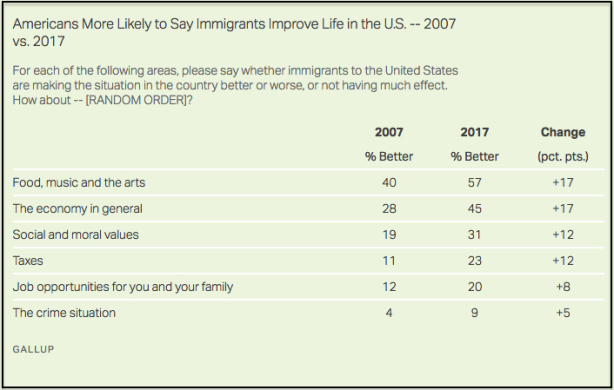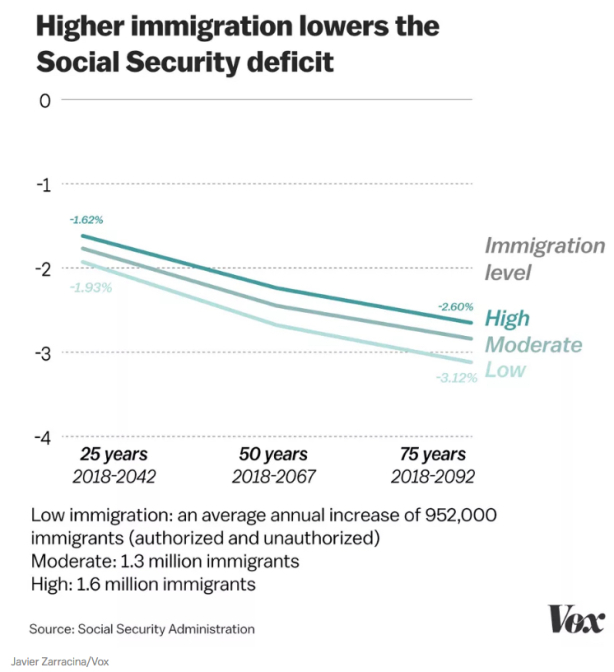From David Ruccio American capitalists love immigration. So, as it turns out, should American workers. The last time I addressed the issue of immigration, I made the argument that recent waves of immigration have benefited a tiny group of employers at the top, who in turn have managed to shift the costs—through wage reductions and higher taxes—onto workers (both recent immigrants and native-born workers). In fact, just a couple of weeks ago, American corporate titans used a collegial dinner with Donald Trump to press him on easing immigration restrictions. As it turns out, Americans have a much more positive view of immigration than they did in 2007—and than Trump and some of his supporters have today. According to a 2017 Gallup poll, a majority of Americans now say immigrants have a
Topics:
David F. Ruccio considers the following as important: Uncategorized
This could be interesting, too:
tom writes The Ukraine war and Europe’s deepening march of folly
Stavros Mavroudeas writes CfP of Marxist Macroeconomic Modelling workgroup – 18th WAPE Forum, Istanbul August 6-8, 2025
Lars Pålsson Syll writes The pretence-of-knowledge syndrome
Dean Baker writes Crypto and Donald Trump’s strategic baseball card reserve
from David Ruccio
American capitalists love immigration. So, as it turns out, should American workers.
The last time I addressed the issue of immigration, I made the argument that
recent waves of immigration have benefited a tiny group of employers at the top, who in turn have managed to shift the costs—through wage reductions and higher taxes—onto workers (both recent immigrants and native-born workers).
In fact, just a couple of weeks ago, American corporate titans used a collegial dinner with Donald Trump to press him on easing immigration restrictions.
As it turns out, Americans have a much more positive view of immigration than they did in 2007—and than Trump and some of his supporters have today. According to a 2017 Gallup poll, a majority of Americans now say immigrants have a positive effect on food, music, and the arts (57 percent), while nearly half say immigration benefits the economy in general (45 percent)—with both of those measures up 17 percentage points from 2007.
Recent studies suggest that American workers should really have an even more positive view of immigration.
One reason is because, as the Social Security Administration’s 2018 trustees demonstrate in their most recent report (pdf), immigrants—both undocumented and legal—lower the Social Security deficit and increase the chances of the program remaining solvent. As Alexia Fernández Campbell explains,
That’s because immigrants, on average, are a lot younger than the overall US population, so their retirement is far off. And undocumented immigrants pay for Social Security, but they’re not allowed to get benefits.
For all three periods, when total net immigration increases, the actuarial balance increases from -1.93 to -1.62 percent for the 25-year period, from -2.68 to -2.24 percent for the 50-year period, and from -3.12 to -2.60 percent for the 75-year period.*
The other reason American workers should support immigration is because immigrants to the United States actually subsidize the healthcare of U.S. citizens. Lila Flavin, Leah Zallman, Danny McCormick, and J. Wesley Boyd recently published a study (unfortunately behind a paywall) in which they compare the healthcare expenditures of immigrants to those of U.S.-born individuals and evaluate the role immigrants play in the rising cost of healthcare. Their conclusions?
Immigrants’ overall expenditures were one-half to two-thirds those of U.S.-born individuals, across all assessed age groups, regardless of immigration status. Per capita expenditures from private and public insurance sources were lower for immigrants, particularly expenditures for undocumented immigrants. Immigrant individuals made larger out-of-pocket health care payments compared to U.S.-born individuals. Overall, immigrants almost certainly paid more toward medical expenses than they withdrew, providing a low-risk pool that subsidized the public and private health insurance markets.
That net benefit to U.S.-born workers will, of course, decrease over time if health insurance and healthcare services continue to be withheld from immigrant workers— since, without adequate healthcare for foreign-born workers, the burden imposed on the U.S. healthcare system will likely increase in the future.
Clearly, U.S.-born workers benefit from the inflow of immigrants, at least in terms of their retirement and healthcare benefits. That may put them on the side of their employers. Where their interests diverge, however, is what happens when immigrants arrive in the United States and begin to work. Capitalists want to maintain a low-cost, growing pool of employees, regardless of their place of birth. However, workers—both U.S-born and immigrant—have every interest in legalizing the status of undocumented immigrant workers and organizing themselves, in order to improve and expand their access to government services and to increase their collective bargaining power vis-à-vis their employers.
Now that’s a wall worth fighting for.
*Of course, increased immigration is not enough to eliminate the Social Security deficit. That can only be done, as I explained in 2012, by eliminating the taxable earnings cap.


